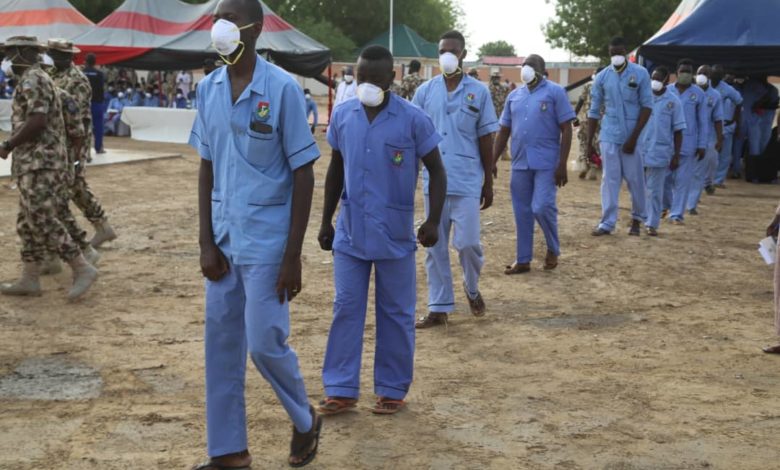
The Centre for Democracy and Development (CDD) has developed a manual that employs transitional justice methods in brokering peace and rebuilding communities ravaged by Boko Haram.
For about a decade, communities in North East Nigeria have been ravaged by the atrocities and aftermath of several insurgency attacks.
To restore peace and rebuild the communities ravaged by Boko Haram, the CDD believes that justice must be inclusive, using the manual as a guide.
The manual is called ‘Sulhu Alheri Ne: Replacing that which is evil with that which is better’.
“This CDD manual looks at transitional justice as an appropriate mechanism for addressing the imperative of justice as an indispensable component of restoring peace.
“The CDD has taken the initiative to develop the requirements that make transitional justice the appropriate mechanism for addressing the imperative of justice as an indispensable component of restoring and sustaining the peace in the communities devastated by the Boko Haram,” it announced on Wednesday via twitter.
According to the organization, the manual has been produced with the primary aim of assembling narrative materials from the traditions of Islamic learning for use in training the Ulama (Islamic scholars).
This is to enable them to communicate messages promoting peace and justice through transitional justice more effectively to their communities.
CDD maintains that the main objective is to elicit the victims’ acceptance of transitional justice as a suitable framework of seeking and obtaining redress of their grievances.
Another key objective is to mentally prepare the victims, as well as the perpetrators, to accept the outcome of the transitional justice process.
This includes the potential reintegration of the perpetrator back into the community instead of his or her incarceration in prison or even the imposition of the death penalty.
Eventually, the victim, the perpetrator, and the communities should understand and embrace the necessary trade-offs between the two systems of justice.
Why transitional justice?
“Transitional justice offers willing Boko Haram (members) the opportunity to demonstrate their repentance and remorse, make amends, render apology, and seek forgiveness from the individuals, families and communities on whom they have perpetrated horrific violence,” the CDD noted in the manual.
It continued, “Transitional Justice is also the appropriate framework for all the stakeholders looking to work towards reconciliation and restoration of peace in the affected communities.”
In the manual, the key virtues that are taught in the selected Qur’anic verses and Hadiths are followed by sections highlighting their relevance to the specific theme under discussion.
Written as lists that highlight the succinct points for consideration, the messages of the selected verses and Hadith are simplified to ensure effective communication to larger audiences.
“The first, and foremost, challenge is the daunting task of sorting out the victims and the perpetrators within each of the four parties involved in the Boko Haram insurgency.
“These are individuals and local communities in the region; Boko Haram insurgents; vigilante groups such as the Civilian Joint Task Force; and soldiers and security agents.
“There are accusations that individuals from each of these sets of people have perpetrated gross violations of human rights, including murder, rape and other forms of sexual and gender-based violence during the decade long insurgency,” the CDD said in the manual.
However, it is important to note that some perpetrators were coerced, while some were accomplices who played minor or subsidiary roles in the violence, such as serving as informants, or providers of logistics and supplies, it further explained.
It added that, in a similar vein, all the victims did not uniformly endure the same trauma and loss, nor are they all in the same predicament in the emerging post-conflict situation.
Ideally, each and every individual perpetrator should be held accountable for his or her conduct in the violence; and each and every victim is entitled to justice for the specific grievances perpetrated against him or her.
Yet providing justice and accountability for each and every victim and perpetrator through the normal criminal justice system is not possible.
Especially given the sheer scale of the numbers of the victims and the perpetrators, as well as the difficulties of ascertaining the circumstances in which specific individuals became victims or perpetrators.
Distrust among perpetrators and victims
The CDD described as daunting, the challenge of widespread distrust in the affected communities.
A major finding of CDD’s telescoping study was that “distrust pervades community relationships on different planes, including distrust between Christians and Muslims, citizens and government, citizens and security agents, and amongst community members.”
Particularly problematic is the distrust against repentant members of Boko Haram, as well as coerced members, the organization noted.
One way or another, CDD maintained, trust must be re-established for the transitional justice process to work effectively and produce acceptable outcomes.
Connected to both the sorting of the victims and perpetrators and the pervasive distrust is the challenge of stigmatization, particularly against coerced members of Boko Haram and individuals with family ties to known members of Boko Haram, but who are not themselves members.
CDD suggested that a major step in constructing narratives to secure acceptance of transitional justice in the affected communities is to begin by explaining what transitional justice means, how it works, and what it offers to the individuals and communities.
This can be accomplished by comparing and contrasting the roles of the victim and the perpetrator in the formal criminal justice system and in the transitional justice approach.
Support Our Journalism
There are millions of ordinary people affected by conflict in Africa whose stories are missing in the mainstream media. HumAngle is determined to tell those challenging and under-reported stories, hoping that the people impacted by these conflicts will find the safety and security they deserve.
To ensure that we continue to provide public service coverage, we have a small favour to ask you. We want you to be part of our journalistic endeavour by contributing a token to us.
Your donation will further promote a robust, free, and independent media.
Donate HereStay Closer To The Stories That Matter




